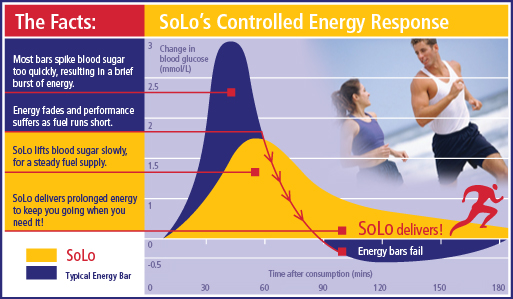 |
|
|
|
The Glycemic Index (GI) is a scientific system of classifying carbohydrate-containing foods according to how quickly they are digested and absorbed by the body. The GI ranks the quality of carbohydrates, on a scale from 0 to 100, reflecting the extent to which they raise blood sugar levels following eating.
|
|
|
|
The glycemic index is divided into 4 classifying groups: |
|
|
GI of 70 or greater High GI
GI of 56-69 Moderate GI
GI of 36-55 Low GI
GI of 35 or less Very low GI |
|
|
|
Foods with High GI values (above 70) are digested and absorbed quickly, triggering a fast and high rise in blood sugar. High GI foods cause a higher and more rapid increase in blood sugar levels than foods with either moderate or low GI values.
|
|
|
|
Low GI carbohydrates (GI values below 55) are broken down slowly, providing a gradual release of sugar into the blood, with minimal impact. This steady response provides a Controlled Energy Response – resulting in optimized fuel delivery, increased energy efficiency and longer lasting energy.
|
|
|
|

|
|
|
|
A lower and slower rise in blood sugar provides sustained energy and can help increase performance levels and fuel efficiency. |
|
|
|
Benefits of Low Glycemic Nutrition |
|
Evidence-based research attesting to the health benefits of following low glycemic nutrition is mounting. Not only do low GI carbohydrates make us feel good while they are in our system, they provide long-term benefit for the body as well. Choosing low GI carbohydrates has been proven to improve health in the following ways: |
|
|
• Lower blood glucose levels
• Lower the risk of developing type 2 diabetes
• Lower cholesterol levels
• Lower risk of developing heart disease
• Weight reduction
|
|
|
|
Why the Glycemic Index is Important |
|
From a health point of view, sharp increases in blood sugar are thought to be undesirable
because of the effect this has on insulin levels. Diets high in refined carbohydrates and low in fiber (high GI) have been shown to significantly increase the risk of developing diabetes, high blood fat levels, high blood pressure and heart disease. |
|
|
|
Your body performs best when your blood sugar is kept relatively constant. If your blood sugar drops too low, you become lethargic and/or experience increased hunger. And if it goes too high, your brain signals your pancreas to secrete more insulin. Insulin brings your blood sugar back down, but consuming a high GI diet over time can tax the pancreas and suppress the ability to continue producing insulin. This can eventually result in conditions referred to as insulin resistance or pre-diabetes, and left untreated, can lead to diabetes and further complications. |
|
|
|
These conditions can be avoided by following a low glycemic diet, where the premise is simply to minimize insulin-related problems by identifying and avoiding foods that have the greatest effect on your blood sugar. |
|
|
|
How to switch to a low GI diet |
|
Glycemic Index Values Foods Chart |
|
|
|
Home | Products | Why Solo? | Solo Athletes | My Sports | Purchase Solo |
|
Company Info | FAQs | Nutrition Resources | News & Events | Health Professionals |
|
Newsletter | Contact | Disclaimer | Terms & Conditions | Privacy Policy | Site Map |
|
|

